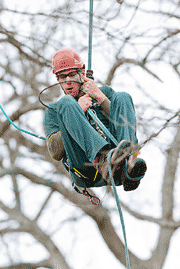|
|||||||||
Way DownstreamAt homes and work, lush foliage can keep you healthier and happier. Indoor plants filter the air we breathe from common pollutants and continuously release oxygen and moisture. One houseplant maintains about 100 feet of air space, according to former NASA scientist Bill Wolverton, author of How to Grow Fresh Air. He discovered that houseplants absorb up to 87 percent of volatile organic compounds (VOCs) like ammonia, formaldehyde and benzene. Orchids are best for the bedroom; they’re more active at night. Best plants for air cleaning any indoor room: peace lilies, ferns, palms, snake plants, broad sword ferns, rubber plants, chrysanthemums, Gerbera daisies and spider plants …
In Prince Frederick, teens tested their pizza palate at Calvert County Library’s Pizza Taste-Off. Sampling slices from all the Prince Frederick area pizzerias that donated pies, adolescent gourmands voted on three characteristic categories. Pizza Hut flattened the competition, taking home two of the night’s prizes — best cheese and best crust. Papa Johns and Ledo Pizza shared best sauce honors … Around the country, battling climate change is now a competitive sport. At Carbonrally.com, teams and singles win bragging rights as they vie to reduce the most carbon emissions. Teams take on personal lifestyles changes — such as drinking tap water, not bottled water; avoiding disposable coffee cups; and cutting the number of catalogs from the mail — to reduce measured pounds of greenhouse gas emissions. Some 150 teams have already signed on to slash their carbon emissions by over 125 tons. This week’s challenge: Knock two minutes off your daily shower time. Use a timer to stay honest. Reducing your shower from eight minutes to six for one month will reduce your CO2 emissions by a total of 15.3 pounds. Find out how to join the competition at www.Carbonrally.com …
In Gaithersburg’s Johnson’s Park, tree climbers from across the mid-Atlantic hustled up trees for prizes and fame. Each year the International Society of Arboriculture’s mid-Atlantic chapter hosts the climbing championship to showcase the strength, savvy and agility of tree climbers — who wield chain saws to cut 100-pound limbs while some 100 feet in the air. This year, 37 men and women competed in a work climb, two-speed climbing events, a throw line and an aerial rescue. Overall winner was James Earhart of Bartlett Tree Experts. Women’s champion was Melissa Lawler of The Care of Trees … Our Creature Feature is a good-news tale from Charles County, where Navy officials appear to have taken seriously the death of 12 bald eagles at the Naval Support Facility in Indian Head between 2001 and 2005. The Washington Post reports that some had flown into power lines and others were electrocuted after landing on towers. With the U.S. Fish and Wildlife Service breathing down their necks, the Navy made structural changes reducing chances of birds getting shocked to death. As a result, no eagle deaths have been reported in three years. College of William and Mary biologist Bryan Watts summed it up. “Eagles need waterfront property. We want waterfront property. That’s really the long-term hope here — that we can coexist in the Bay.” |
|||||||||
|
|||||||||
|
|
|||||||||
|
© COPYRIGHT 2008 by New Bay Enterprises, Inc. All rights reserved.
|
|||||||||
 Volume 16, Issue 17 - April 24 - April 30, 2008
Volume 16, Issue 17 - April 24 - April 30, 2008
